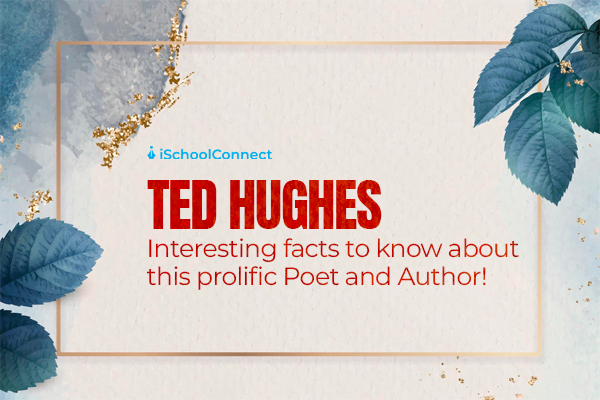Table of Contents
Ted Hughes was a renowned poet, translator, and children’s book author from England. Critics consider him as one of the best poets of his generation and one of the greatest authors of the twentieth century. In 1984, he was named Poet Laureate, a position he retained until his death. In 2008, Hughes was named fourth on The Times’ list of “The 50 Greatest British Writers Since 1945”.
Hughes was married to Sylvia Plath, an American poet, from 1956 until her death by suicide at the age of 30 in 1963. Birthday Letters (1998), his most recent poetry work, addressed their connection. Ted Hughes also produced book translations. He translated Federico Garcia Lorca’s Blood Wedding and Frank Wedekind’s Spring Awakening.
If you love poetry and want to learn more about Ted Hughes’s genius here are some interesting facts you need to know!
Early Life and Family

Hughes was born to William Henry and Edith (Farrar) Hughes at 1 Aspinall Street in Mytholmroyd, West Riding of Yorkshire, and grew amid the local farms of the Calder Valley and on the Pennine moorland. Hughes had a sister, Olwyn Marguerite Hughes, and a brother, Gerald Hughes.
When Ted Hughes was seven years old, his family moved to Mexborough, South Yorkshire, and ran a tobacco and newspaper business while they were there. Hughes had a fascination with animals since he was a child. When his elder brother Gerald went hunting, he would follow him. He also enjoyed fishing, swimming, and picnics.
Education
Ted Hughes started formal schooling at the age of seven at Burnley Road School in Mytholmroyd. He began attending Schofield Street junior school in Mexborough town a year later, where his family has relocated. He then eventually transferred schools and finally enrolled at Mexborough Grammar School.
His sister Owlyn and his professors helped him in honing his writing skills. Hughes began writing when he was 15, and at the age of 16, he realized he wanted to be a poet. He went on to write stories and poetry for their school magazine, The Don and Dearne. In 1946, his poem Wild West was released. It was his first piece of writing, and it was published in the magazine. In 1948, Ted received his diploma. He was granted a scholarship to Pembroke College in Cambridge, but he preferred to begin his military duty with the National Guard.
Ted Hughes worked for the Royal Air Force as a radio mechanic on the ground in East Yorkshire. He would occasionally read Shakespeare’s works in his leisure time. Soon he went to Pembroke College, where he majored in English and received a scholarship. Hughes also studied Anthropology and Archaeology in his third year before returning to writing.
Career
Ted Hughes worked in a range of occupations between the years 1955 and 1956. He worked as a night watchman, gardener, zoo attendant, and teacher, among other things. In February 1956, he co-founded the literary periodical St. Botolph’s Review. In the same journal, some of his writing was accepted for publication. Later, he and his newlywed wife, Sylvia Plath, settled in Cambridge. His work The Hawk in the Rain, which won the first prize in 1957, was written at that time.
In 1957, he and his wife came to the United States. He eventually went to Amherst, Massachusetts, to teach at the University of Massachusetts. Meanwhile, he continued to write. In 1959, they took a trip throughout the country and eventually returned to England when his wife became pregnant. Lupercal, his first work, was released in 1960, shortly after his return to England.
Ted Hughes began writing children’s books in 1961. He began by writing humorous poetry for children in the book Meet My Folks! and went on to write 18 more children’s novels after that.
Personal Life and Controversies
Hughes and Plath bought a house Court Green in North Tawton, Devon, in 1961, after having two children, Frieda Rebecca and Nicholas Farrar. Hughes then began an affair with Assia Wevill, an upcoming German poet who was subletting the Primrose Hill flat with her husband, in the summer of 1962.
Ted and Sylvia divorced in the fall of 1962, and she moved into a new flat with their children. Sylvia committed suicide a year after Hughes’s affair with Assia. Hughes was held to account for her death but he kept his silence rather than defending himself.
Following the death of his estranged wife, Sylvia Plath, Ted Hughes’ mistress Assia Wevill too committed suicide and tragically killed their four-year-old daughter Shura. Hughes was accused of abusing both Plath and Wevill following their deaths.
A year later, Hughes married Carol Orchard who remained his wife until his death. His final work, Birthday Letters, was released just before he passed away.
Death
He died of a heart attack on October 28, 1998, in Southwark, London, while receiving treatment for colon cancer. His funeral was held at North Tawton church on November 3, 1998, and he was cremated in Exeter.
Legacy

In 2005, a memorial path was established from the Devon settlement of Belstone to Hughes’s memorial stone above the River Taw on Dartmoor, and a Ted Hughes poetry trail was established in 2006 in Stover Country Park, also in Devon.
Hughes’ wife Carol Hughes presented a memorial plaque for him in North Tawton on April 28, 2011. ‘Ted and I: A Brother’s Memoir’, a memoir by Hughes’s brother Gerald, was released late in 2014, and Kirkus Reviews called it “a sympathetic reminiscence of a famous poet.”
The Elmet Trust has placed a plaque at Lumb Bridge near Pecket Well, Calderdale, honoring Hughes’ poem “Six Young Men,” which was inspired by an old photo of six young men taken there during the First World War.
Takeaways
Although Hughes is regarded as one of the best poets of the twentieth century, His reputation as a poet was arguably unfairly defined during his lifetime by unfortunate personal tragedies,
It would be appropriate to refer to Ted Hughes as a nature poet. His work is defined by a mythical framework in which lyric and dramatic monologues are used to express complicated concepts. Throughout his work, animals appear as deities, metaphors, personification, and emblems.
His poetry seems to emerge from the clouds of rumor and hearsay, establishing him as one of the greatest poets of all time.
Liked this blog? Read John Keats | 5 best poems every student should know!
FAQs
Q1. What is the most well-known poem by Ted Hughes?
Answer – ‘The Thought-Fox’ a poem, from Hughes’s debut book ‘The Hawk in the Rain’ (1957), is regarded as one the most popular works of Hughes.
Q2. What sets Ted Hughes apart from other contemporary poets?
Answer – Ted Hughes is one of those poets known for his use of symbolism in his poetry, although his presenting manner differs from that of many current writers.
Q3. What influenced Ted Hughes’ poetry?
Answer – Hughes’s work was hugely influenced by the rural environment of Yorkshire, where he grew up.






